YMCA Secretaries Basic Training Course 2020 organized virtually
Last Updated (Monday, 07 December 2020 15:23)
The bi-annual Basic Training Course (BTC) for the YMCA Secretaries of the APAY brought together eleven young professionals from 10 countries of the AP region. The BTC 2020 is significant because the training is organized virtually, perhaps for the first time in BTC's history! For two weeks, participants joined online for two and a half hours starting from November 8 -22. Another experience of the “new normal” of the COVID19 era as countries have travel restrictions and precautionary measures to combat the COVID19 pandemic.
The BTC participants are full-time staff and volunteers in local YMCAs working with the communities in different roles and capacities.
- IMMANUEL BOIRAGY, Gen Secretary of Chittagong YMCA, (Bangladesh)
- HEM THEL, Act. Gen Secretary(Cambodia YMCA)
- FONG MUEN SHEUNG (Franky), &
- YIU CHUNG LAM (Andrew) Principal Program Secretary and Research officer of the Chinese YMCA of Hong Kong
- LIA GAZELLA PRANATA, full-time Volunteer of Solo YMCA(Indonesia)
- CHANDARUCK SOMSANGIUM(Peak) executive secretary, Laos YMCA Organizing Committee,
- ONG PHAIK HOON (Dorothy), Hon. Secretary and Program organizer of Kedah YMCA (Malaysia),
- CHOJILSUREN UYANGA, Manager, Mongolia YMCA,
- AYE THAZIN, National Coordinator of Myanmar YMCA,
- ROGELYN D. RAZON – program assistant of Cagayan de Oro YMCA, Philippines,
- JAYASINGHE LALANTHA PRASANNA YOHAN, Gen Secretary of Kandy YMCA Sri Lanka.
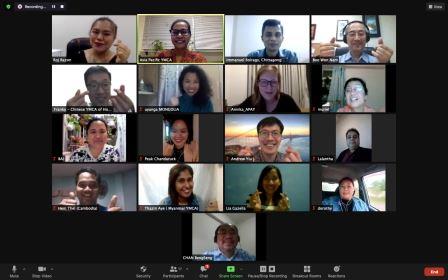 |
| ↑ Basic Training Course participants including the APAY staff |
The BTC's primary aim is to capacitate the new and younger professional secretaries of YMCAs of the Asia Pacific region not provided with necessary training facilities in their respective YMCAs. Moreover, the BTC is a deliberate attempt to strengthen the YMCA staff's capacity as a community-based people-centred organization. Mindful of the changes and challenges to leadership development and leadership practice in strengthening the relevance of the movement. The 2020 training course module is a shortened version of the original face to face training program module due to virtual meetings' limitation.
Together We Stand for Just Peace Towards A Better World was an overarching theme to discourse and articulate the contextual realities from the perspectives of justice and peace. Very much rooted in our Christian faith, and the core concerns in the Asia Pacific context, as our faith upholds that and motivates us to strive for Justice and Peace for a better world.
The participants explored the areas of Contemporary Christian Theology; Ecumenism& Ecumenical Movements; History & Mission, Structure, Governance system of YMCA; YMCA’s response to Contextual Realities and Social Analysis; Sustainable Development Goals (SDGs); Quadrennial Program Plans of APAY- Alternative Tourism; Interfaith and Peacebuilding; Youth Empowerment; Gender Justice; Disaster risk management, etc., Mission and Vision of different YMCAs they belong.
Dr. Ahn Jae Woong, (Chair- Board of Trustees at the NCY – Korea), Dr. Raj Bharath Patta, (Presbyter at the Stockport Methodist Circuit in the UK), Gen. Secretary APAY-Nam Boo Won, Ms. Cristina Miranda,(Exe Secretary APAY), Mr. Chan Beng Seng,(Coordinator- GATN- APAY) Dr. Muriel Montenegro, (Coordinator ICF- APAY), Mr. Edward Ong (International Service Director – Y’s Men’s International), Ms. Sunita Suna( Exe Secretary -APAY and organizer of the BTC) facilitated the sessions through thematic inputs, presentations, discussions- including breakout group discussions, Q&A sessions, etc.
The BTC was designed to use the participants as resource people, to share their contextual realities and their YMCA’s responses. It was relevant to hear from them as they are connected with the grassroot communities. As Dorothy from Malaysia said, “there is much more to learn from each other as colleagues from YMCAs.”
They also highlight the socio, political, economic realities, the problems and challenges, and how their YMCAs respond to those challenges? Their presentations also featured the situation of the ongoing COVID19 Pandemic in their countries.
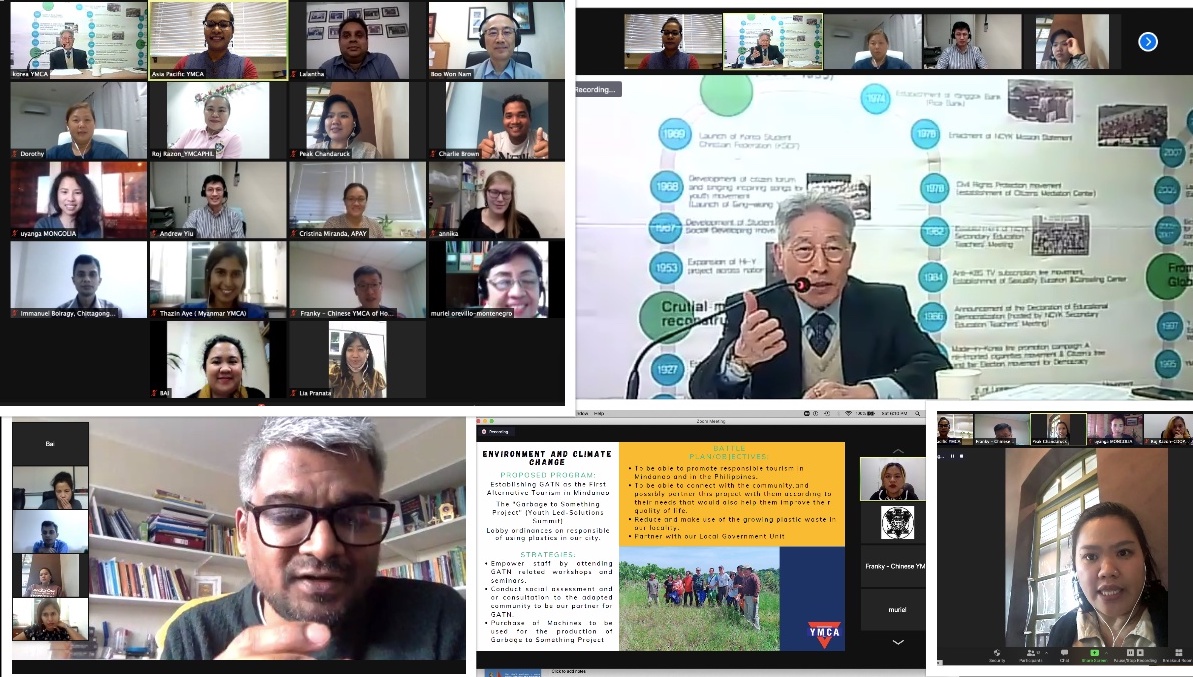 |
| ↑ Resource persons Dr. Ahn Jae Woong, Dr Raj Bharath Patta facilitating session |
The basic training course was also an opportunity to reflect and introspect the work of different YMCAs in line with the mission, vision, identity.
A summary of the reflections are:
 How the work of different YMCAs guided by the mission and vision of the YMCAs as the participants revisited the APAY's fundamental principles and documents, such as the Paris Basis, Kampala Principle- Challenge 21. This certainly broadened their understanding of the history, mission, vision, structure, identity, and importance of the YMCA's governance system -the foundation of the organization.
How the work of different YMCAs guided by the mission and vision of the YMCAs as the participants revisited the APAY's fundamental principles and documents, such as the Paris Basis, Kampala Principle- Challenge 21. This certainly broadened their understanding of the history, mission, vision, structure, identity, and importance of the YMCA's governance system -the foundation of the organization. - Christian faith is an integral part of the YMCA. Contemporary Christian Theology- faith and praxis in public spheres challenged us to relate our Christian faith to the contextual realities. Faith and praxis should go hand in hand, and faith must motivate and inspire us to express our faith in public spheres by taking action against any kind of violation of God’s creation.
- How do we understand YMCA, an ecumenical movement, especially in the Asian context? How ecumenical movements like YMCA should be focused on being “gospel-centered” and “life-centered.” “mission-oriented,” “peace-oriented,” “justice-oriented,” and “value-oriented”?
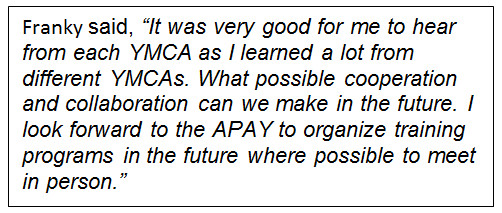 YMCA in the Asia Pacific region has diverse identities due to its diverse contexts. Identifying the problems, challenges, and social issues based on our geographical locations is crucial to enable YMCAs' actors to respond to the realities they confront in their communities. Hence, the social analysis of the unjust structure of socio, political, and economic realities significantly reshapes our perspectives and approach to address social justice issues.
YMCA in the Asia Pacific region has diverse identities due to its diverse contexts. Identifying the problems, challenges, and social issues based on our geographical locations is crucial to enable YMCAs' actors to respond to the realities they confront in their communities. Hence, the social analysis of the unjust structure of socio, political, and economic realities significantly reshapes our perspectives and approach to address social justice issues.
- Why and how YMCA should address the 2030 UN Agenda - the Sustainable Development Goals (SDGs)? What are the opportunities we have in networking and collaborating with the CSOs in our local communities in responding to the SDGs?
The Quadrennial Program Plans (2020-2023) guides our actions or interventions through programs and activities develop based on the Challenge 21. The ongoing programs like - Alternative Tourism- travel the YMCA way, Interfaith, and Peacebuilding with communities youth empowerment, gender justice, disaster risk management, etc. The BTC guided on how the issues and programs can be realized at the YMCA of Asia Pacific's local or grassroots levels.
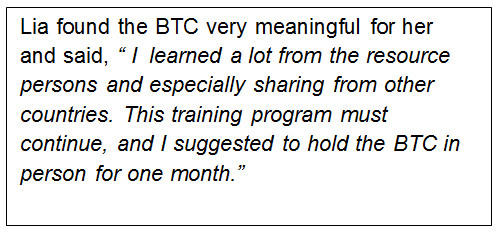 At the end of the training, participants shared the plan of actions based on the mission and vision of YMCAs, integrating the input at the BTC for the local YMCAs. Some program proposals to bring as recommendations to the national YMCA leadership. Participants shared their overall experiences of virtual BTC and gave feedback for the future virtual program/training.
At the end of the training, participants shared the plan of actions based on the mission and vision of YMCAs, integrating the input at the BTC for the local YMCAs. Some program proposals to bring as recommendations to the national YMCA leadership. Participants shared their overall experiences of virtual BTC and gave feedback for the future virtual program/training.
Though most participants found the BTC meaningful and beneficial for their work, there were limitations and challenges to organizing a two-week training online. This was the first time for the organizers and the participants to experience virtual training. We received valuable feedback from participants, and there are lessons learned to improve the BTC if we have to hold it virtually in near future.
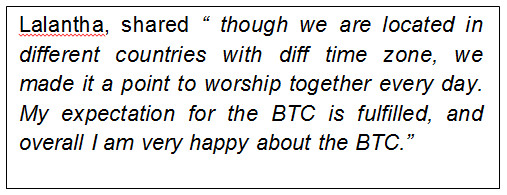 Overall, despite the limitations of the virtual training, the two weeks basic training program provided a common space/platform for the leaders of local YMCAs and have deepened understanding, developed perspectives, new insights, friendship, partnership, networks to work together with common goals. BTC was also a place to pray and worship together to draw inspiration from our faith. All participants expressed that the BTC was meaningful and helpful to perform their roles effectively and meaningfully.
Overall, despite the limitations of the virtual training, the two weeks basic training program provided a common space/platform for the leaders of local YMCAs and have deepened understanding, developed perspectives, new insights, friendship, partnership, networks to work together with common goals. BTC was also a place to pray and worship together to draw inspiration from our faith. All participants expressed that the BTC was meaningful and helpful to perform their roles effectively and meaningfully.
A graduation ceremony was conducted on the final day of the BTC. Apart from the GS and the APAY staff, the president of APAY Chen-Chin Seng also joined the last day program and delivered congratulatory remarks to the participants, followed by words of encouragement by GS Nam Boo Won. An electronic certificate was given to the participants. APAY is grateful to Asia Pacific Area and Korea Area of YMI for their generous ASF contribution to the BTC this year.
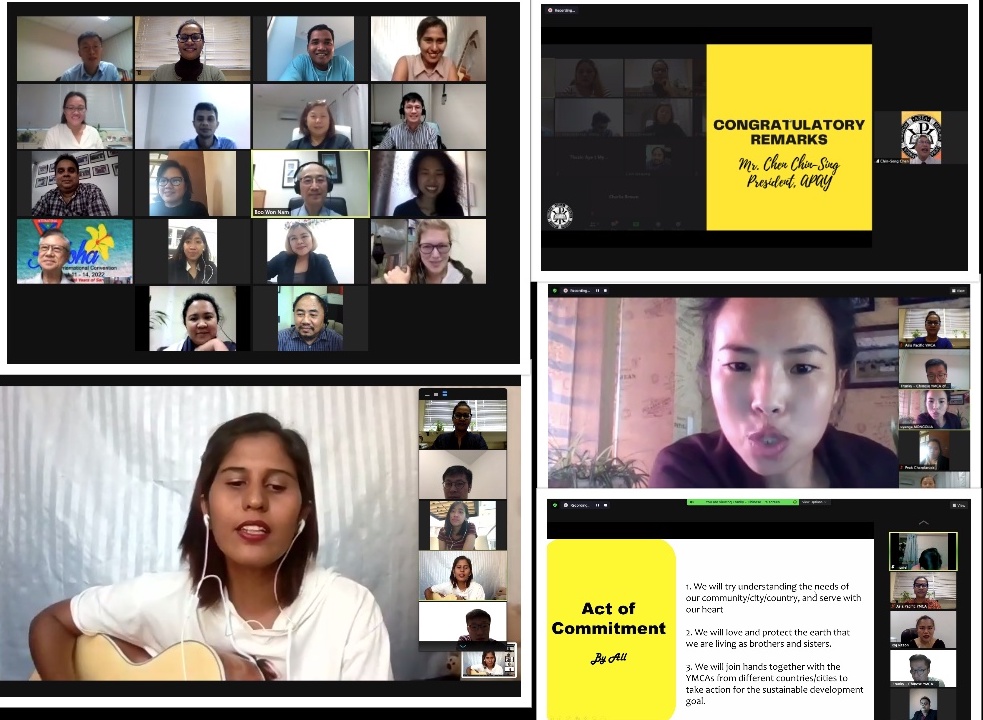 |
| ↑ Last day of BTC - President Chen Chin-Seng delivered congratulatory remarks |
~ Sunita Suna, Executive Secretary for Programs






